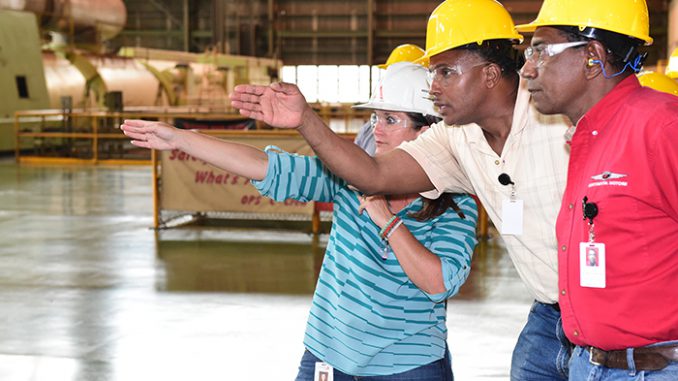
Mississippi Power Offers Teachers Job-Embedded Training Over the Summer
By Kristen Dechert
Connections Magazine
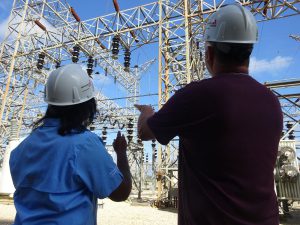
Most likely, Mississippi Power was not expecting a full-page, single-spaced thank-you letter, but that is exactly what they got from Ben Stansbury, a robotics and engineering teacher at Ocean Springs High School and one of 10 teachers on the Mississippi Gulf Coast to participate in a summer externship at the company.
“People know their lights come on, but they often don’t fully understand the internal working parts of an energy company,” said Ann Holland, community development specialist at Mississippi Power. “With this program, teachers receive hands-on training and an in-depth look at many areas of our energy plants.”
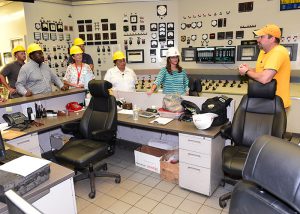
The Mississippi Power Teacher Externship Program is a full work week of job-embedded summer training for teachers. By seeing the most up-to-date equipment and processes, teachers are better able to prepare their students for the types of jobs and environments they will experience in their careers. Though only there for a week, participants are treated like regular Mississippi Power employees. They arrive for a
half-day employee orientation, in which they learn the company’s standards for safety and company culture. They also tour one of two generating plants on the Coast: Plant Daniel in Pascagoula or Plant Watson in Gulfport. Following orientation, each teacher is placed in one of these facilities for their 40-hour externship.
Ten teachers participated this past summer: two chemistry teachers and eight CTE teachers from a variety of pathways, including construction, engineering, polymer science, aquaculture, and more. The externship assignment was aligned to the teacher’s content area, said Holland. C
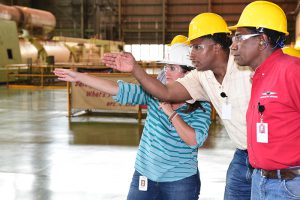
hemistry, polymer science, and aquaculture teachers were placed in the water lab; construction, welding, and engineering teachers in the maintenance department; and the career pathways experience teacher floated between departments.
Foundations for the Program
In Mississippi, the energy pathway is housed in the science, technology, engineering, and mathematics, better known as the STEM, career cluster. However, energy jobs can be found in many pathways and career clusters, such as agriculture, architecture and construction, manufacturing, and transportation.
“Energy careers are often buried in other pathways, so we find that students, and even teachers, don’t truly understand all of the career options at energy companies,” said Holland.
In response to this feeling of hidden careers, company officials reached out to the Mississippi Department of Education (MDE) to discuss ways to improve visibility of the energy pathway and career options. Additionally, Charles “Bubba” Weir, director for business and industry development at the MDE, wanted to create opportunities for teachers to gain hands-on training in the field.
Through these discussions over the course of several months, the Mississippi Power Teacher Externship Program launched in late spring 2017.
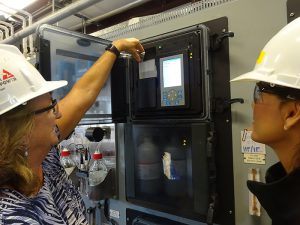
The Pilot and Its Impact
Weir originally approached the company with a request of four to five slots, but they came back and offered 20, a move that noted their commitment to the program and to K-12 teachers, said Weir. Due to timing, they weren’t able to fill all 20 slots this year but expect increased enrollment in 2018.
“Especially in CTE, our students have work-based learning in the classroom, and we wanted to find some work-based learning for our teachers as well,” said Weir. “An externship gives teachers a chance to ‘sharpen their saw,’ so to speak, by going back into the business world and seeing the latest trends and practices.”
‘Seeing the latest trends and practices’ is one of the major benefits Stansbury gleaned from his externship. Being embedded in Mississippi Power for a week was so impactful that the 20-year veteran teacher found his perspective on his purpose as a teacher shifting. Over the years, Stansbury has seen a consistent drive toward college preparation for all students, and a drive toward an engineering degree for his particular students. During the externship, Stansbury saw about 100 employees
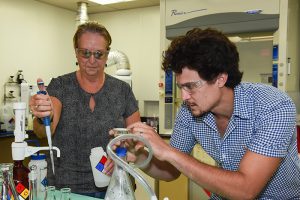
at his plant but only two with the title “engineer.” Stansbury noted the realization that people in the engineering field have a variety of degrees and levels of education motivated him to begin thinking about his role as an educator somewhat differently.
“It’s been a slow process for me to realize, but there’s a shift to more focus on getting kids ready for the workforce, not just ready for college,” said Stansbury. “They don’t all have to be engineers; some of the jobs require just a couple of years of college and some no college at all. I, as a teacher, have to be ready to make that shift.”
According to Stansbury, parents are on board with the shift too: “When parents come by and see my classroom and see the kids working on robots and animatronics for a local haunted house, the first thing they say is ‘I wish I’d had this class when I was in school.’”
One of the company’s main goals with the externship is “to introduce high school students to their energy career options by educating teachers at our facilities,” said Holland, and it seems this is working out exactly as planned in Stansbury’s case.
“Plant Watson is right off the interstate, and the kids pass by all the time, but nobody actually knows what goes on in there. Now I can tell my students about it because I saw it firsthand,” said Stansbury.
In February, the students will get to see it firsthand as well when Stansbury and his class will travel to Plant Daniel to watch Mississippi Power employees break down their largest generator to perform routine, preventative maintenance, something the students could see only every 10 to 15 years.
Externships in the Future
Though the pilot was concentrated on the Coast this first year, Holland said increasing and diversifying academic and CTE representation in other parts of Mississippi Power’s service area is a goal for future years.
“As we expand to other pathways, such as marketing, we will be creative in how we place teachers in their externships to ensure they receive the best experience possible at Mississippi Power,” she added.
Good news travels fast, for several other companies have reached out to the MDE for starting something similar at their facilities, said Weir. Along with MDE Associate State Superintendent Jean Massey, Weir is working to
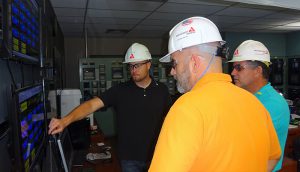
grow externship opportunities for CTE and non-CTE teachers statewide.
“Once we have the infrastructure in place, our hope is that teachers can begin to identify externship opportunities in their local communities. We want every teacher, librarian, counselor, and any other educator to have the opportunity to participate in an experience like this,” said Weir.
For more information about the Mississippi Power Teacher Externship Program and other externship opportunities, contact Weir at cweir@mdek12.org.
